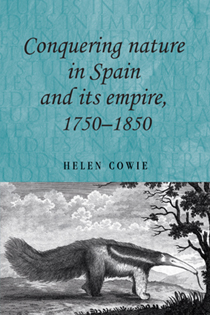Conquering Nature in Spain and its Empire, 1750-1850 (Manchester: Manchester University Press, 2011)
Helen Cowie
Between 1750 and 1850, Spain made a concerted effort to survey, catalogue and exploit the natural productions of its overseas possessions, arranging a series of scientific expeditions, and cultivating and displaying American fauna and flora in metropolitan gardens and museums.
Conquering Nature in Spain and its Empire assesses the cultural significance of natural history in the Hispanic World, exploring the figurative and utilitarian value attached to natural objects - from globetrotting elephants to three-legged chickens – and considering how the creation, legitimisation and dissemination of scientific knowledge reflected broader questions of imperial power and national identity. Taking a transatlantic approach to the history of science, Conquering Nature examines the contribution of colonial subjects to the wider imperial research project. Of particular interest is the ambiguous position of Creole (American-born Spanish) naturalists, who were simultaneously anxious to secure European recognition for their work, to celebrate the natural wealth of their homelands, and, in some cases, to defend local forms of knowledge against universal European systems.
Conquering Nature considers how and where knowledge about the natural world was created, assessing the relative merits of the field, the botanical garden and the natural history cabinet. This analysis continues into the post-independence period, when many northern European naturalists descended on the former Spanish colonies, and when the emerging nation states of South America sought to establish their own museums of natural history.
Helen Cowie is a Lecturer in the Department of History and a member of the Centre for the Americas. Her research focuses on the cultural history of science with a particular focus on the history of animals.

